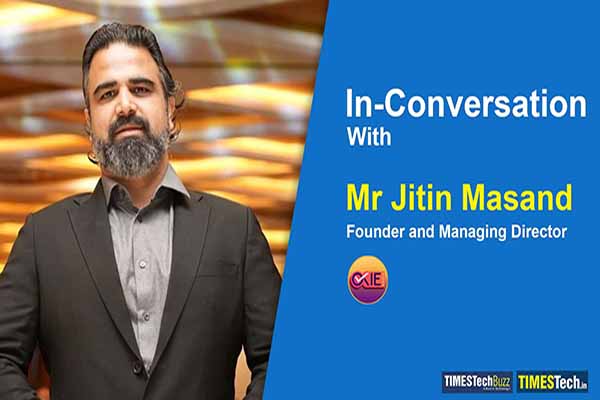Okie is actively involved in exploring opportunities to expand its market presence globally, which involves entering new markets, forming partnerships with local distributors or retailers. Times Tech interacted with Mr. Jitin Masand, Founder and Managing Director, OKIE to learn more about Television manufacturing, latest market trends and career opportunity avenues in the Electronics consumer industry.
Times Tech: What are key market trends, drivers and challenges for Television manufacturing?
Mr. Jitin Masand: The television manufacturing industry in India has undergone a significant transformation, fuelled by the global pandemic and rapid advancements in technology. Currently, the global television production fraternity is facing a massive surge in customer demand. The pandemic, along with technological advancements, has brought about major developments in manufacturing operations, leading to a constant revolution in the industry. As a result, television manufacturers are now compelled to focus on extensive technological innovation and unique selling propositions (USPs) to cater to today’s customer demands and stay ahead of their competitors.ss
Amidst this highly competitive landscape, manufacturers must continually innovate and introduce new television models to keep up with market trends. Factors such as increasing demand for Smart TVs, the widespread adoption of 4K and OLED technologies, and a growing interest in large-screen TVs are shaping the market trends for television manufacturing. Moreover, consumers are increasingly desiring televisions with higher resolution displays, and 4K Ultra HD TVs are gaining significant popularity. At the same time, they are expressing a preference for larger screen sizes to elevate their viewing experience. Additionally, the rising popularity of internet connectivity and access to various streaming services have contributed to an expanded consumer base for Smart TVs. However, these market trends also present challenges for manufacturers, as shorter product lifecycles and the need for frequent product refreshes require a robust supply chain and efficient production processes
Times Tech: In a rapidly evolving tech landscape, how can India stay ahead of the competition? What measures OKIE took to maintain its position as a leader in the industry?
Mr. Jitin Masand: In the fast-paced and ever-changing tech landscape, India can stay ahead of the competition by adopting various measures that foster continuous innovation, embrace emerging technologies, prioritise talent acquisition and development, adopt a customer-centric approach, and exhibit agility and adaptability. At OKIE, we understand the significance of these aspects and have implemented strategies to maintain our position as a leader in the industry.
Firstly, we prioritise continuous learning and staying abreast of the latest technological trends. Our team regularly attends training programs to ensure we remain at the forefront of innovation. Additionally, we also emphasise collaboration and partnerships. By forming strategic alliances with other tech companies, we leverage collective knowledge and resources to drive innovation. This approach enables us to access diverse perspectives, pool expertise, and accelerate the development of new solutions.
Furthermore, OKIE invests heavily in research and development. We allocate a significant portion of our resources to explore emerging technologies, conduct experiments, and develop prototypes. This commitment to R&D enables us to bring cutting-edge products and services to the market and maintain our competitive edge.
Lastly, agility and adaptability are inherent in our operations. We proactively monitor the market, quickly respond to shifts, and adjust our strategies and offerings accordingly. This flexibility enables us to seize emerging opportunities and tackle challenges head-on.
Times Tech: How do you see the future outlook of the Indian Electronic Industry aligning with India’s vision in becoming Vishwa Guru?
Mr. Jitin Masand: India’s aspiration to become a global leader, known as Vishwa Guru, encompasses various sectors, including the thriving electronics industry. This industry has witnessed remarkable growth and holds immense potential to support India’s vision through advancements in manufacturing, innovation, research and development, skill development, employment, digital transformation, and export potential.
India aims to establish itself as a prominent global manufacturing hub, with the electronics industry playing a pivotal role in this pursuit. The government’s “Make in India” initiative and policy reforms have successfully attracted both domestic and foreign investments, incentivising electronics manufacturing. This industry has the capacity to significantly contribute to India’s GDP and generate numerous job opportunities.
As India emphasises digital transformation and the expansion of its digital infrastructure, the electronics industry assumes a vital role. To achieve the vision of becoming a Vishwa Guru, India requires a highly skilled workforce proficient in electronics manufacturing, research, and development. Investment in training programs, vocational education, and skill development initiatives is crucial for nurturing a skilled workforce that can support the industry’s growth.
However, to seize these opportunities and align with India’s vision, certain challenges need to be addressed. These include infrastructure development, enhancing the ease of doing business, ensuring access to capital, and implementing regulatory reforms.
Times Tech: What are exciting career opportunity avenues in the Electronics consumer industry?
Mr. Jitin Masand: The electronics consumer industry offers a wide range of exciting career opportunities across various sectors. Some of these avenues include:
- Manufacturing and Operations: These roles focus on efficient production and manufacturing processes of electronic consumer goods
- Sales and Marketing: Sales managers, marketing executives, product managers, and digital marketing specialists are essential in promoting and selling electronic consumer products. They develop marketing strategies, manage product launches, analyse market trends, and build relationships with customers and retailers
- Customer Support and Service: With the growing complexity of electronic consumer products, there is an increasing need for professionals who can provide customer support and service.
- Retail and E-commerce: The retail and e-commerce sectors offer opportunities to work with electronic consumer products at various stages of the value chain
- Research and Development (R&D): R&D careers focus on technological advancements and innovation within the electronics consumer industry. Research scientists, engineers, and technologists work on developing new technologies, improving product performance, and exploring future trends
- Sustainability and Environmental Compliance: With the increasing emphasis on sustainability, professionals who can ensure compliance with environmental regulations and drive sustainability initiatives are in demand. Roles such as sustainability managers, environmental compliance specialists, and green product managers fall under this category.
Times Tech: Collaboration and partnerships play a significant role in the tech industry. How does OKIE foster relationships with other organizations and leverage partnerships to drive innovation?
Mr. Jitin Masand: We recognise the vital role of collaboration and partnerships in fostering innovation within the technology industry. We have established strategic alliances with a diverse range of companies, both within and beyond the tech sector, to effectively combine resources, exchange knowledge, and work together towards shared objectives. These alliances encompass a variety of forms, such as Research and Academic Collaborations, Industry Consortia and Standards Organisations, Supplier and Vendor Partnerships, Open Innovation Initiatives, Ecosystem Development, and other collaborations aimed at driving industry growth and advancement.
Times Tech: Supply-chain problems, lack of manpower, fluctuating dollar, and inflation are a few of the challenges being faced by India’s electronics industry. How do you see the way forward to these challenges?
Mr. Jitin Masand: The challenges faced by India’s electronics industry, such as supply-chain problems, lack of manpower, fluctuating dollar, and inflation, are indeed significant and require careful consideration. At OKIE, we recognise these challenges and have devised strategies to navigate through them.
To address supply-chain problems, we have established robust partnerships with reliable suppliers and manufacturers both domestically and internationally. By diversifying our supplier base and ensuring transparent communication channels, we aim to mitigate the risks associated with disruptions in the supply chain. Additionally, we actively monitor market trends and make timely adjustments to our sourcing strategies to optimise cost and efficiency.
Addressing the shortage of skilled manpower is a top priority at OKIE. We invest in comprehensive training programs and initiatives for skill development, aiming to enhance the capabilities of our workforce. By fostering a culture of continuous learning and providing opportunities for career growth, we strive to attract and retain talented individuals who can contribute to our overall success.
Moreover, the volatility of the dollar and inflation significantly impact the profitability of the electronics industry. So, OKIE employs effective risk management strategies, including hedging and financial planning. We closely monitor currency fluctuations and utilise hedging instruments to mitigate potential losses. Furthermore, we continually evaluate our pricing strategies and engage in cost optimisation measures to counter the effects of inflation, ensuring our competitiveness in the market.
Times Tech: The COVID-19 pandemic impacted business globally and witnessed major disruptions in Electronics Industry globally. How did you navigate the challenges posed by the pandemic, and what lessons were learned during this period?
Mr. Jitin Masand: At OKIE, we proactively responded to the pandemic and navigated through the challenges with resilience and adaptability. Firstly, we ensured the safety and well-being of our employees by implementing strict health and safety protocols. Remote work arrangements were swiftly put in place, enabling our teams to continue operations while minimising the risk of transmission. We provided the necessary resources and support to facilitate a smooth transition to remote work, ensuring productivity and business continuity.
The pandemic also disrupted global supply chains, causing delays and shortages. To mitigate these challenges, OKIE maintained close communication with our suppliers, closely monitoring the situation and proactively identifying alternative sourcing options. Our agility and flexibility in sourcing allowed us to overcome disruptions and meet customer demands.
Furthermore, the pandemic highlighted the importance of digitalisation and technology adoption. OKIE accelerated our digital transformation initiatives, leveraging advanced technologies to streamline operations, enhance remote collaboration, and strengthen our online presence
The lessons learned during this challenging period have been invaluable. OKIE has reinforced the significance of risk management and contingency planning. We have diversified our supplier base further, implemented supply chain resilience measures, and strengthened our financial stability to withstand future disruptions.
Times Tech: How does OKIE foster innovation through research and development initiatives, and what role does it play in driving technological advancements in the consumer electronics sector?
Mr. Jitin Masand: We foster innovation by effectively allocating resources and investments towards research and development (R&D) endeavours. This involves dedicating a portion of our budget and manpower to exploring, experimenting, and creating new technologies, products, and features.
To promote innovation, we take significant steps such as collaborating with research institutions, conducting user research and employing design thinking methodologies, prototyping and testing, continuous learning and talent development, and monitoring market trends and competition. Additionally, we prioritise the protection of intellectual property rights and constantly modernise our R&D practices.
In order to drive technological advancements, we closely monitor market trends, emerging technologies, and competitive landscapes. This enables us to identify gaps, evaluate opportunities, and align our R&D efforts accordingly. We strongly believe in user-centric approaches, which involve gathering insights from users and incorporating them into the R&D process. By doing so, we ensure that the development of our consumer electronics aligns with market demands and enhances the overall user experience.
Moreover, we place great importance on intellectual property protection as a means to encourage and support innovation. By securing patents and safeguarding our inventions, we can protect our R&D investments and maintain a competitive edge. Additionally, intellectual property rights enable us to license our technologies and foster collaborations with other industry players.
Times Tech: Can you discuss the OKIE approach to product design and how it incorporates user feedback and market research to create innovative and user-friendly devices?
Mr. Jitin Masand: We give high priority to user-centric design principles, which involve placing the user at the heart of the product development process. This approach centres around comprehending user needs, behaviours, and preferences through thorough research and feedback. To achieve this, we employ design thinking methodologies that entail empathising with users, defining their requirements, generating solution ideas, building prototypes, and conducting tests.
Additionally, we conduct market analysis to gain a comprehensive understanding of the competitive landscape, identify trends, and uncover potential gaps in the market. This allows us to align our product design efforts with market demands and identify opportunities for innovation. Furthermore, usability testing is an integral part of our process, involving the observation of users as they interact with the product and gathering feedback on usability, functionality, and overall satisfaction. The data collected through these tests is then utilised to identify areas for improvement and make informed design decisions.
We also conduct user research to obtain valuable insights into the target market. This research involves various methods such as surveys, interviews, focus groups, and usability testing. By directly engaging with users, we gather their feedback, understand their pain points, and identify opportunities for improvement. This enables us to enhance the user experience, differentiate our products, and maintain competitiveness in the consumer electronics market.
Times Tech: What are the future growth plans and strategic initiatives of OKIE to expand its market presence and capitalise on emerging opportunities in the consumer electronics industry?
Mr. Jitin Masand: We are committed to diversifying our product portfolio in order to meet the changing demands of consumers. This entails expanding into new product categories and developing innovative features and functionalities to set our offerings apart. We actively explore opportunities to expand our market presence globally, which involves entering new markets, forming partnerships with local distributors or retailers, and adapting our products to suit the specific needs and preferences of different regions.
We also prioritise investments in digital transformation initiatives to enhance our online presence, optimise our e-commerce capabilities, and improve the overall customer purchasing experience. This includes developing robust online platforms, utilising data analytics to gain valuable customer insights, and implementing omnichannel strategies to provide a seamless shopping experience across multiple channels.
Furthermore, recognising the growing importance of sustainability to consumers, we have made sustainability initiatives a top priority. This includes the development of eco-friendly products, improving energy efficiency, implementing responsible manufacturing practices, and promoting recycling and effective product life-cycle management.
Lastly, we strive to enhance the overall customer experience by delivering exceptional customer service, personalising our product offerings, and leveraging data analytics to gain a deeper understanding of customer preferences. This enables us to tailor our marketing and sales efforts accordingly, ensuring a more targeted and effective approach.















